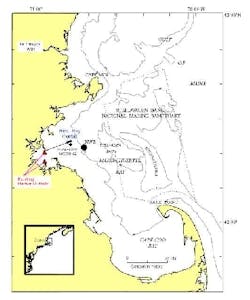Sewage tunnel goes into operation in Boston.
BOSTON, Sept. 6, 2000. (UPI) Boston Harbor, once considered the dirtiest in the nation, gets much cleaner starting Wednesday, but critics fear Massachusetts Bay and Cape Cod may suffer as a result.
Officials Wednesday activate the longest offshore sewage tunnel in the world, designed to carry a daily average of 320 millions of gallons of treated waste water previously dumped into the harbor well out into the bay.
The outfall tunnel extends 400 feet down from the Deer Island treatment plant and extends 9.5 miles east through undersea rock bed out into the bay.
The waste water will be diffused into the bay 100 feet below the surface over the final mile of the concrete-lined, 24-foot diameter tunnel.
Construction on the project began in 1991 at a time when the harbor was fouled by more than 100 tons of raw sewage a day. The $3.1 billion Deer Island treatment plant was put into operation three years ago, cutting that to just 20 tons a day. With the activation of the outfall pipe, constructed at a cost of $390 million and the lives of five workers, officials said that is reduced to zero.
Massachusetts Water Resources Authority Executive Director Douglas B. MacDonald said that 85 percent of the pollutants will be removed from the waste water at the treatment plant before it is pumped out into the bay, but critics remain concerned that even then it will upset the ocean food chain and slowly poison marine life in the bay and eventually cause environmental problems on nearby Cape Cod.
"We have a great fear," Mary Loebig of Cape Cod told The Boston Globe. "We are expecting it will be slow degradation, not the big disaster."
Jay Crotchley, an artist in Provincetown at the tip of Cape Cod, told the Boston Herald the diffused discharge is "a potentially disastrous event."
He said it is "incredible to think that day after day what effect that would have" on Cape Cod's ecology.
Charles "Stormy" Mayo, a whale specialist at the Center for Coastal Studies in Provincetown, told the Globe, "Ocean systems are delicately balanced and when those balances are thrown out of whack, it can radically change the whole system that is there."
MacDonald tried to calm such fears, noting almost $3 million a year will be spent to monitor the treated sewage as it is dispersed into the bay.
"Massachusetts Bay is now one of the best studied bodies of water in the world," he said. "We know our job is to watch it carefully. And that is exactly what we will be doing."
© 2000 UPI All Rights Reserved.
null
Massachusetts and Cape Cod Bays, present sewage outfalls in Boston Harbor (triangles), location of new ocean outfall in Massachusetts Bay, the USGS long-term mooring, the National Weather Service buoy (NWS), and the location of the Stellwagen Bank National Marine Sanctuary. The 40- and 80-m depth contours are also shown. Courtesy of the U.S. Geological Survey. For a more in depth study of the predicted effects of the new tunnel and movie clips of outfall modeling.

